Hiring Best Practices
The “Quality First” AI Hiring Checklist for Better Hires
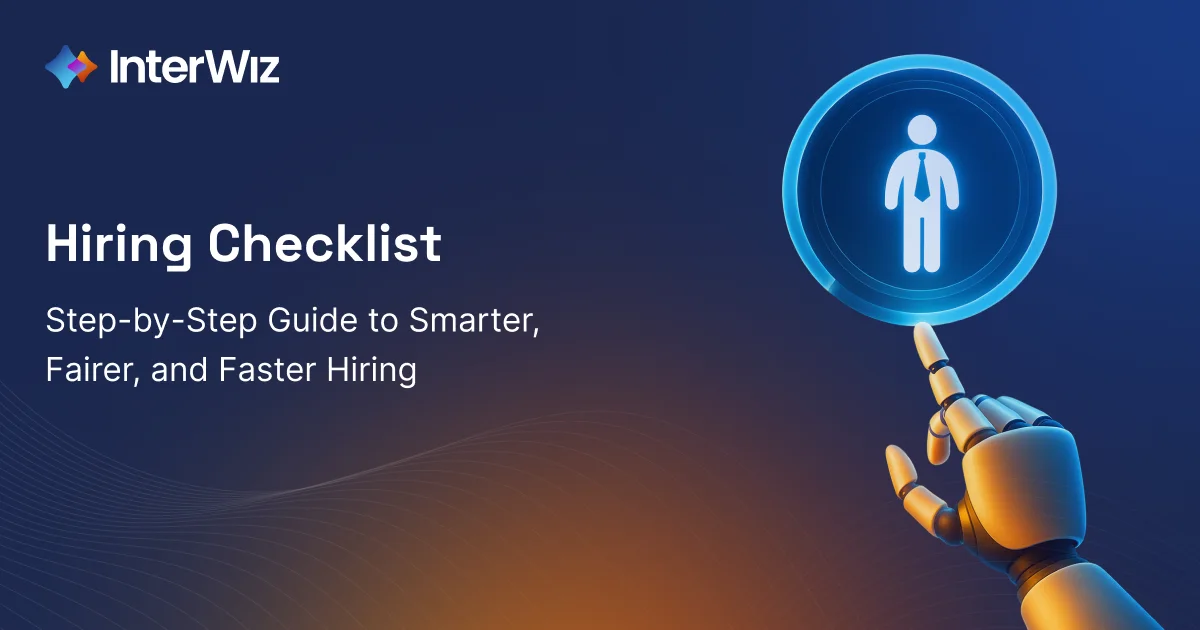
Recruiters don’t have a shortage of applicants anymore. The problem is the opposite: too many résumés, too little certainty about who’s actually a good hire. LinkedIn’s Future of Recruiting 2024 shows that more than half of talent leaders believe quality of hire will be the defining metric over the next five years.
The challenge is that applicant pools keep growing, but confidence in choosing the right people keeps shrinking. You’ve probably seen it yourself. Hundreds of résumés come in within days, but only a fraction have the skills or staying power your team needs. Meanwhile, every hour spent screening the wrong people pushes you further behind and gives your competitors a head start.
This is where AI is changing the game. Instead of just giving you more résumés, AI tools help you define success upfront, screen candidates for real ability, run fair and structured interviews, protect the candidate experience, and tie everything back to business outcomes.
This guide will walk you through a five-step AI hiring checklist - so you can stop chasing volume and start making hires who perform and stay.
1. Define “Quality” Before You Post the Job
Almost 90% of HR leaders say quality of hire is critical, but only one in four feels confident measuring it. This gap explains why roles get filled fast but don’t always stick.
You’ve probably seen it happen: three quick hires, celebrated as a win. A quarter later, one resigns, another is missing targets, and the manager is already asking you to restart the search. Speed wasn’t the problem; the definition of success was.
AI tools help you codify this definition into role-specific assessment templates and competency models, so your success criteria move from a slide deck into the actual hiring workflow.
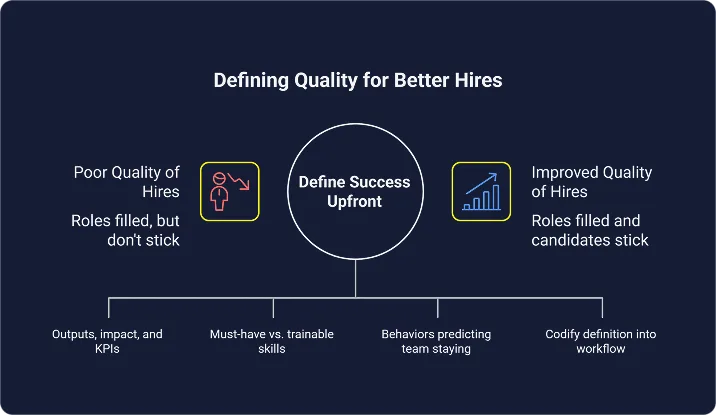
The fix is simple. Before you post the job, align with your hiring manager on three essentials:
What success looks like in the role (outputs, impact, or KPIs).
Must-have skills vs. trainable skills, so strong candidates aren’t lost over minor gaps.
The values or behaviors that predict staying power on this team.
Get this right, and the goal is to carry the same definition of quality through every downstream step, from screening to interviews. That’s not easy to do manually, which is why AI tools become so valuable. They ensure the criteria you’ve set at the start actually guide who gets shortlisted, how candidates are evaluated, and how success is measured later.
2. Screen Candidates for Quality, Not Just Volume
Screening consumes a significant amount of recruiter time. According to iHire’s 2025 survey, more than 30% of your week goes to reviewing applications. Yet most employers still say it’s harder than ever to judge whether candidates actually have the right skills. Résumés look polished, but they don’t prove performance.
Think about the “perfect” CV that ticks every box. The candidate listed Python and SQL, possibly with a certification or two. But in the interview, they struggled to solve even a basic problem. Meanwhile, the quiet high performer who didn’t keyword-stuff their résumé never made it past the first screen.
That’s why AI screening tools are now essential. They cut through keyword stuffing and surface the candidates who actually have the skills and staying power to succeed.
A quality-first screen looks different:
Parse résumés with AI to instantly filter noise and surface candidates aligned with your success profile.
Test skills with AI early to confirm ability, not just claims.
Rank candidates with AI on weighted criteria, so interviews focus only on the strongest fits.
With InterWiz, AI résumé parsing works hand in hand with structured AI-led screening interviews. Candidates are automatically ranked on weighted assessments, so your best-fit hires rise to the top, not just the loudest résumés.
3. Use AI Interview Tools to Ensure Hiring Quality
Unstructured interviews may feel natural, but they’re unreliable. Research shows structured interviews are nearly twice as effective at predicting job performance, yet many teams still “wing it.” The result? Candidates face different questions, scoring methods, and expectations for the same role, and your evaluations end up inconsistent at best.
AI interview tools don’t just standardize the process. They ensure every candidate is measured fairly and consistently, while surfacing deeper insights into both technical and soft skills.
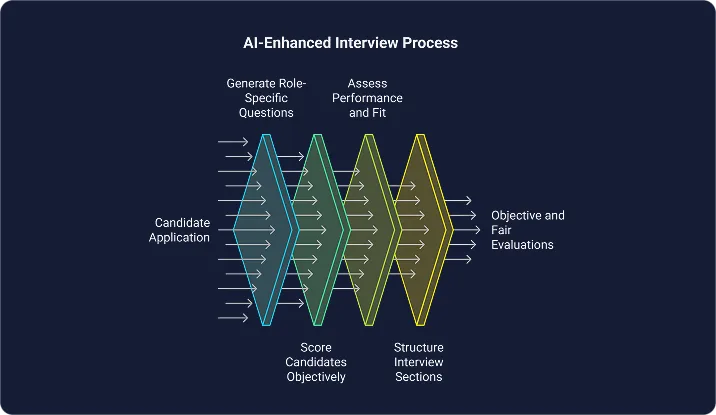
A quality-first interview checklist:
Generate role-specific questions with AI to keep every conversation aligned.
Score candidates with AI on a shared rubric, so evaluations are objective and comparable.
Assess performance and fit with AI by balancing technical tests and soft-skill insights.
Structure interviews into clear sections with AI guidance, starting with introductions, moving into technical and analytical questions, and closing with space for candidates to ask about the role and company.
With InterWiz, interviews are fully AI-led and structured. Each candidate is scored on the same rubric, and recruiters can assign weightage across technical, coding, or soft-skill tests. The result: objective scoring, fairer evaluations, and interview data that stands up to both compliance requirements and leadership scrutiny.
4. Use AI to Protect Candidate Experience (and Quality of Hire)
A great candidate won’t wait through a bad process. Research shows 60% of job seekers abandon applications if the process feels too long or complicated. Even when you’ve found a strong prospect, you can still lose them to silence, delays, or clunky workflows.
Picture this: you finally shortlist three promising candidates. But scheduling drags out, feedback takes weeks, and communication goes quiet. By the time you’re ready to move, your top choice has already accepted another offer.
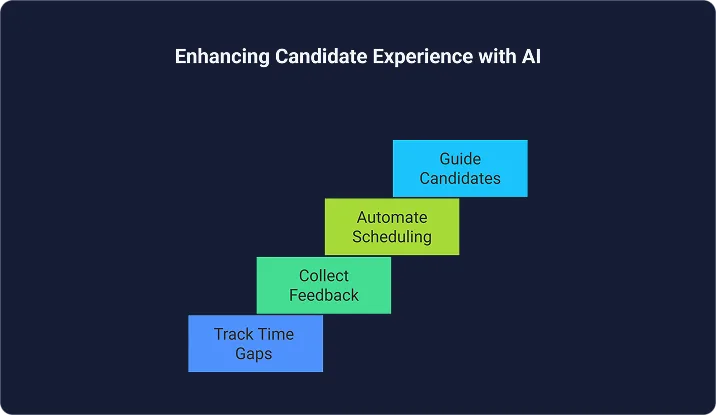
A candidate-first hiring checklist for protecting quality:
Track time gaps to spot slowdowns between each candidate touchpoint.
Collect feedback with AI surveys after interviews to uncover pain points quickly.
Automate scheduling and updates with AI tools, so no candidate is left waiting.
With InterWiz, interviews are scheduled only after assessments are ready, and AI handles updates, reminders, status changes, and next steps. Candidates feel guided at every stage, while recruiters save hours of back-and-forth.
5. Use AI Analytics to Link Hiring to Business Outcomes
Most teams track time-to-fill or cost-per-hire, but those numbers don’t reveal whether the hire actually worked out. Only 44% of TA teams track quality of hire, while far more track speed and retention. No wonder leadership questions whether recruiting truly drives business value.
Picture presenting your metrics in a leadership meeting. You show faster time-to-fill, but the CFO asks, “Are these hires performing? Are they staying?” Without that data, efficiency looks like smoke and mirrors.
A quality-first analytics checklist:
Track first-year attrition with AI to see which hires stick.
Measure time-to-productivity with AI analytics to understand ramp-up speed.
Validate AI interview scores against performance reviews to confirm your process predicts real outcomes.
Teams that link hiring data to outcomes build credibility with leadership and gain the budget and trust to keep improving. InterWiz reports connect interview scores and candidate rankings with hiring outcomes, giving recruiters clearer evidence to link evaluation quality with on-the-job performance.”
Turning ‘Quality First’ Into Reality with InterWiz AI
Knowing what to do is one thing. Making it repeatable at scale is another. InterWiz was built to take the guesswork out of hiring, so this hiring checklist isn’t just theory; it’s your daily workflow.
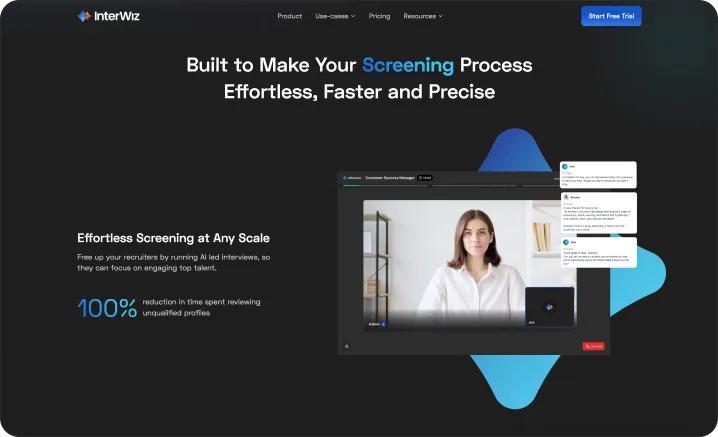
Here’s how InterWiz brings each step of the checklist to life:
Define quality upfront with customizable interview templates and role-specific success profiles.
Screen smarter with AI résumé parsing paired with structured, skill-based interviews.
Run consistent interviews where every candidate is scored on the same criteria.
Protect the candidate experience through AI-driven scheduling, reminders, and clear communication.
Prove business impact with reports that link interview scores to real performance and retention.
Recruiters who switch to InterWiz save time, reduce bias, and, most importantly, make better hires who stay and perform. If you’re ready to stop chasing volume and start proving quality, InterWiz is how you make it happen.
Bottom Line: Quality First Is the Only Hiring Checklist That Matters
Recruiting today isn’t about chasing résumés or racing to close roles. It’s about whether your hires perform, stay, and fuel growth. That’s the real measure of success.
The way to get there is simple: define what quality means upfront, screen with evidence, not assumptions, run consistent interviews, protect every candidate’s experience, and tie results back to business outcomes.
AI makes this shift possible at scale. With tools like InterWiz, quality stops being a vague goal and becomes a measurable, repeatable process, one that surfaces the right candidates faster, reduces bias, and proves impact with hard data.
Because in the end, it’s not about hiring more people. It’s about hiring the right people.
FAQs about Hiring Checklist
What is a quality-first AI hiring checklist?
It’s a step-by-step framework recruiters use to prioritize quality of hire over volume. The hiring checklist covers defining success, screening for skills, running structured interviews, measuring candidate experience, and linking hires to business outcomes.
How does an AI interviewer improve the quality of hire?
An AI interviewer improves the quality of hire by automating résumé parsing, standardizing interviews, reducing bias, and linking candidate data to performance outcomes. Tools like InterWiz also rank candidates and weight different assessments so recruiters can focus on those most likely to succeed.
Which metrics actually measure quality?
Key quality of hire metrics include first-year retention, time-to-productivity, performance reviews compared with interview scores, and candidate experience feedback. Together, they give a more accurate picture of hiring success than time-to-fill or cost-per-hire alone.
Do structured interviews improve quality of hire?
Yes. Studies show structured interviews are almost twice as effective at predicting job performance compared to unstructured ones. With AI-led structured interviews, every candidate is scored on the same rubric, giving you more consistent, fair, and accurate hiring decisions.

High Quality Screening with AI Interviews
Automated interviews built for speed, scale, and accuracy.
🔥 Full features, no credit card required.